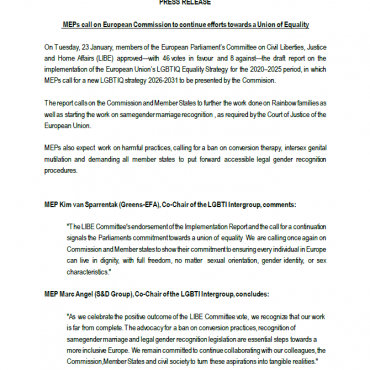LGBTI rights still at risk in the EU, says EP report on fundamental rights
On 16 January, the Eu ropean Parliament adopted its yearly report on Fundamental Rights in the EU, assessing the implementation of fundamental rights in the EU in 2017 according to the Charter of Fundamental Rights standards. It contains strong language on multiple aspects of LGBTI rights.
ropean Parliament adopted its yearly report on Fundamental Rights in the EU, assessing the implementation of fundamental rights in the EU in 2017 according to the Charter of Fundamental Rights standards. It contains strong language on multiple aspects of LGBTI rights.
A whole paragraph of the report (36) highlights that “in 2017 LGBTI people were still victims of bullying, harassment and violence and were facing multiple discrimination and hatred in areas including education, health, housing and employment”.
It also stresses:
– that the fight against gender-based violence includes violence towards LGBTI people
– the lack of knowledge and intervention of authorities from law enforcement authorities in the EU, especially towards trans and marginalised LGBTI people, and calls on Member States to adopt policies that address LGBTIphobia at large.
Paragraph 36 of the report also includes calls on the Commission to:
– mainstream a gender identity perspective in its work on gender-based violence
– maintain its multiannual action on LGBTI rights and ensure the sustainability of the LGBTI List of Actions (2014-2019), in cooperation with civil society
“This report sends a very clear message: LGBTI rights are fundamental rights and it is EU’s duty to keep defending them. In times where we see them increasingly questioned across the EU, we need to have all EU institutions on board, including the Commission”, said Daniele Viotti, co-chair of the LGBTI Intergroup.
The report also takes a strong stance against LGBTI conversion therapy for the second time in a row, as well as a condemnation of the pathologisation of trans and intersex identities.
“LGBTI conversion therapy is unfortunately still practised in too many member states.” said Malin Bjork, vice-president of the LGBTI Intergroup. Being LGBTI is not a sickness or something that should be” fixed”. The European Parliament must keep on condemning this practice until it disappears.”
Finally, the report also points out that fast-track procedures, safe country lists and the Dublin procedure present a specific risk for LGBTI people who seek asylum in the EU (para. 11).






